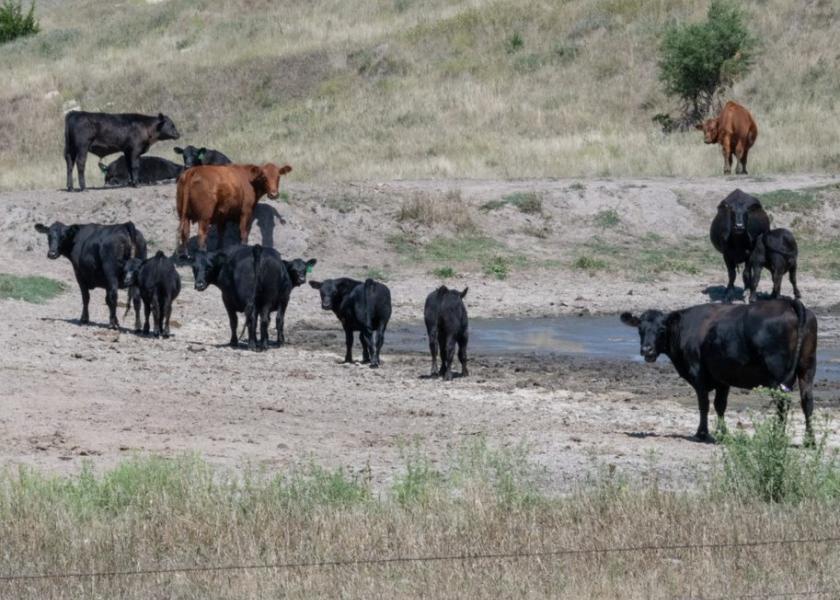Surviving The Harshest Conditions, Parasites Remain A Burden Despite Drought

While parasites tend to thrive in pasture areas with sufficient moisture and lush grass, drought does not necessarily mean the threat of parasites no longer exists—drought can just exacerbate the exposure to those parasites and the clinical disease associated with parasite infections, says Brian Herrin, DVM who specializes in parasitology at Kansas State University (KSU) College of Veterinary Medicine.
Internal parasites cause the livestock industry an estimated $3 billion in annual losses, says A.J. Tarpoff, DVM, beef extension veterinarian at KSU—highlighting the need for producers to take action against the significant drain on herd productivity.
Specifically impacting cattle health and economic returns, internal nematodes (worms) decrease voluntary feed intake which is the physiological response caused by changes in the abomasum, followed by decreased absorption and digestion of critical nutrients. Additionally, immune function can be compromised by parasitic infections.
Parasites in Drought
A majority of the country faced levels of drought during the last growing season—producing dry barren ground in many places—which is not an ideal place for parasites to survive, Herrin notes. However, parasite eggs are very resilient and can survive in the environment for long periods of time—including surviving drought and winter conditions, Tarpoff adds. As parasite eggs hatch, molt and change forms twice, the infective “L3” state emerges and is picked up as cattle graze—entering the abomasum or intestinal tract—to continue their life cycle into adults. Adult parasites then lay eggs that are passed through the digestive tract and end up in the external environment via manure.
It's easy to think that parasite populations would be reduced in a drought, however, there are more factors to consider when it comes to parasite transmission.
“First, in drought times the animals may congregate closer together near the water source or the remaining grasses—creating a focal area of high contamination—where the cattle may pick up more parasites than if herd was spread out over a larger area,” Herrin explains. “The drought likely has reduced the overall feedstuffs, and now the cattle are not grazing on nice, tall, healthy grass, but instead are ingesting anything nutritious they can find, including the very last nubs of grass close to the ground, putting the animal in closer contact with potential fecal contamination.” Additionally, cattle may be more likely to eat the hay that has been trampled or defecated on if there is reduced access to high quality hay.
Maturity plays a role in herd infection rates. In general, calves are much more susceptible to internal parasites compared to mature cattle—while bulls are often more susceptible than cows, Tarpoff says. Cows around four years of age often have developed a decent immunity to internal parasites.
“Even within each class of animal, infections are not evenly distributed. It is estimated that within a herd, 20% of cattle harbor 80% of internal parasite infections due to differences in immune status and other genetic factors,” Tarpoff says.
While parasites can often be managed by the immune system of most healthy adult cattle, Herrin adds, the stress of drought and the potential reduced nutrition can set the animals up for higher parasite burdens or greater clinical signs associated with those infections.
Parasite Control
Treatment of internal parasites has numerous benefits to beef cattle production, including improved health, increased weaning weights and increased fertility, Tarpoff notes. A number of de-worming (anthelmintic) products are available on the market with multiple application options such as injectable, oral drench, feed additives and pour-on formulations.
Alongside deworming products, there are several management practices that may help keep parasites at bay, especially during drought situations.
“It is always difficult because droughts put a strain on every aspect of production. In general, keeping high quality feed and water available to the animals is key,” Herrin says. “Keeping the feed up off the ground if you are supplementing can help reduce the amount of fecal contamination the cows are exposed to. If the animals closely congregate, you may even consider removing old hay from the ground to reduce the parasite contamination in that area.”
Herrin adds, some of these management practices may not need to be implemented during normal, temperate weather conditions, and having a local veterinarian take a look at your overall system can be a helpful resource.
“The second set of eyes can help identify areas that may be at risk of becoming heavily contaminated with parasites and provide some practical options for reducing the overall parasite burden during a drought season,” Herrin says.







